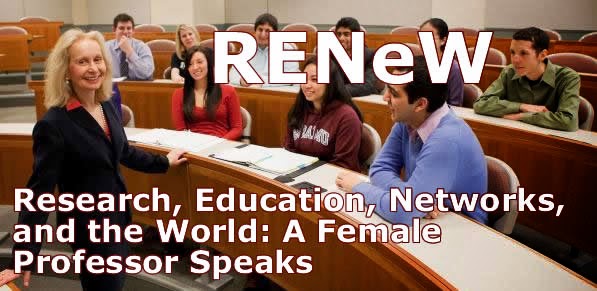So, during this winter break, while revising a paper and finishing up two papers, after the holiday celebrations, I found time to read the book, which my husband had a copy of. My husband has a PhD in physics, as did Morse. The below photos are taken from the book and I was excited to see one female featured but that was at a ceremonial dinner of the Japanese Union of Scientists and Engineers (JUSE).
I had met Philip Morse when my husband and I were grad students at Brown University and Professor Bob Beyer, of acoustics fame, invited us to a reception of the Acoustical Society, which was having its meeting in town and we were introduced to Morse. Interestingly, my industrial jobs, while pursuing my Master's in Applied Math at Brown, were in technical consulting for the naval submarine sector in Newport, Rhode Island. My very first project involved developing software in AN-UYK assembly language for submarine transiting so that the enemy would not be able to detect the submraines via sonar. Hence, I enjoyed the chapters of the Morse book that described the scientific challenges of the wartime efforts.
Reading his autobiography was very special, I must say. I am also a big fan of the Operations Research Center at MIT since I had an NSF Visiting Professorship there and organized a speaker series to bring outstanding females in OR to speak.
Morse was an amazing scientist, contributing to both physics and to the, at that time, still young, but growing, discipline of Operations Research, which he was passionate about and used his extensive network of friends and contacts to promote, whether in Washington or in Europe (including NATO and the OECD). He wrote glowingly about the founding of IFORS, the International Federation of Operations Research Societies, and its first meeting in 1957 in Oxford, followed by the conference (very successful) in Oslo. Also, Morse was the first President of ORSA, the Operations Research Society of America, the precursor to INFORMS. His doctoral student, John D.C. Little, renowned in OR, wrote a nice tribute in his honor, that was published in the journal Operations Research on its 50th anniversary.
I enjoyed reading about how Morse was instrumental in promoting computers at MIT in the 1960s and also the challenges that he faced but, nevertheless, the Computation Center was established. I was delighted to hear him mention the role that Marvin Minsky played, who was then a young mathematician in computing and who was to become the founder of artificial intelligence. His daughter, Margaret, is a neighbor of mine in Amherst and his son and my daughter graduated Deerfield Academy together. I saw Marvin last time at the graduation festivities.
In his autobiography, Morse talks about the joys of teaching and of conducting research. On page 66, he states: "the devising of a new theory, or even the extension of a known one, is exploration, with all the excitement and trials and false starts and effort of any exploration. It is somewhat like putting together an intricate jigsaw puzzle."
On page 119, he write: "I have always learned new subjects quickly; perhaps breadth rather than depth was best for me. .. Perhaps the most interesting life results from following one's interests, wherever it leads, rather than by assuming some rigid set of obligations, self-imposed or set by others." Morse was an explorer in the truest sense of the word.
Morse was a voracious reader, reading 4 to 5 books a week, with many in the humanities. He considered his books, both those in physics and in operations research, as some of his greatest publications.
Another favorite quote from the book appears in page 318: "The delights of research in O/R (he used the slash) are multiple. To me the pleasure coming from understanding how traffic behaves is as great as that coming from understanding how two atoms combine. In addition, the practical applications of O/R theory are often immediate and satisfying." I could very much relate to his fascination with traffic, a research topic that I have pursued since my graduate days at Brown working with Professor Stella Dafermos.
In the next to the last chapter of the book, he writes about a request by the National Academy of Sciences in January 1962 by President John Kennedy to "evaluate and recommend research on behalf of the conservation and development of America's natural resources." The ultimate report identified 10 recommendations, including: to conduct research on pollution and its effect on man's total environment. However, once the report went through the review and publication processes, the President had been assassinated and the world had lost its stability.
The final chapter ends with the following beautiful lines: "For those who like exploration, immersion in scientific research is not unsocial, is not dehumanizing; in fact, it is a lot of fun. And, in the end, if one is willing to grasp the opportunities, it can enable one to contribute something to human welfare."
And physicists and operations researchers continue to tackle some of the most challenging problems today whether in terms of energy, pollution, or even healthcare.
In March, I will be speaking in Berlin on "Design of Sustainable Supply Chains fr Sustainable Cities," at the Symposium (SOE/DY) Physics of Sustainability and Human-Nature Interactions, upon the invitation of physicists.
Professor Morse's legacy lives on through all of us.





















